#HACCP Level 3
Explore tagged Tumblr posts
Text

#𝗛𝗶𝗴𝗵𝗳𝗶𝗲𝗹𝗱 𝗨𝗞 𝗡𝘂𝘁𝗿𝗶𝘁𝗶𝗼𝗻 & 𝗛𝗲𝗮𝗹𝘁𝗵 𝐂𝐨𝐮𝐫𝐬𝐞𝐬#Level 2#• Highfield Level 2 International Award in Nutrition and Health#Level 3#• Highfield Level 3 International Award in Nutrition and Health#Contact Us:#Mob:#+919787872866#Email:#[email protected]#Web:#www.cosmostrg.com#WhatsApp Channel :#https://whatsapp.com/channel/0029VaHMYayGufJ45OH4Xo1n#WhatsApp Group :#https://chat.whatsapp.com/IunhDueyuLsEPc9SkB7dlK#highfieldcourses#highfield#habc#nutritioncourse#nutritiontrainingcourse#nurtrition#nutritiontraining#nutrition_and_health#healthcourses#nutritionhealth#FoodSafetyTraining#foodsafety#foodtrainingcourse#haccp
0 notes
Text
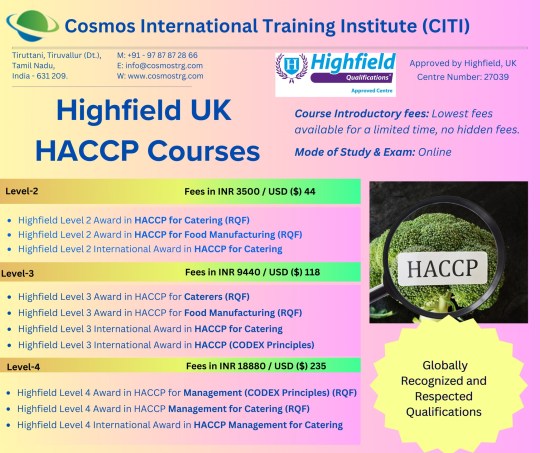
#𝗛𝗶𝗴𝗵𝗳𝗶𝗲𝗹𝗱 𝗨𝗞 𝗛𝗔𝗖𝗖𝗣 𝗧𝗿𝗮𝗶𝗻𝗶𝗻𝗴 𝐂𝐨𝐮𝐫𝐬𝐞𝐬#Level 2#• Highfield Level 2 Award in HACCP for Catering (RQF)#• Highfield Level 2 Award in HACCP for Food Manufacturing (RQF)#• Highfield Level 2 International Award in HACCP for Catering#Level 3:#• Highfield Level 3 Award in HACCP for Caterers (RQF)#• Highfield Level 3 Award in HACCP for Food Manufacturing (RQF)#• Highfield Level 3 International Award in HACCP (CODEX Principles)#• Highfield Level 3 International Award in HACCP for Catering#• Highfield Level 3 International Award in HACCP for Manufacturing#Level 4:#• Highfield Level 4 Award in HACCP for Management (CODEX Principles) (RQF) v2#• Highfield Level 4 Award in HACCP Management for Catering (RQF)#• Highfield Level 4 International Award in HACCP Management for Catering#Contact Us:#Mob:#+919787872866#Email:#[email protected]#Web:#www.cosmostrg.com#WhatsApp Channel :#https://whatsapp.com/channel/0029VaHMYayGufJ45OH4Xo1n#WhatsApp Group :#https://chat.whatsapp.com/IunhDueyuLsEPc9SkB7dlK#highfield#highfieldcourse#highfieldcourses#highfieldukcourses
0 notes
Text
Mastering Envesca Level 3 Food Safety
Discover the importance of mastering Envesca Level 3 Food Safety with this comprehensive guide.
Understanding Envesca Level 3 Food Safety Certification
Envesca Level 3 Food Safety Certification is a comprehensive training program that provides individuals with the knowledge and skills necessary to ensure food safety in their professional roles.
This certification covers a wide range of topics, including food handling and storage, personal hygiene, cleaning and sanitizing, and hazard analysis.
By understanding Envesca Level 3 Food Safety Certification, professionals can effectively implement food safety protocols and prevent foodborne illnesses.
It is important to note that this certification is recognized and respected by industry professionals and regulatory agencies.
Obtaining Envesca Level 3 Food Safety Certification demonstrates a commitment to food safety and can enhance career prospects in the food industry.
Key Concepts Covered in Envesca Level 3 Food Safety Training
Envesca Level 3 Food Safety Training covers a range of key concepts that are essential for maintaining food safety standards.
Some of the key concepts covered in this training include:
- The importance of personal hygiene in preventing food contamination
- Proper food handling techniques to prevent cross-contamination
- Safe practices for food storage and temperature control
- Cleaning and sanitizing procedures to maintain a hygienic environment
- Hazard analysis and critical control points (HACCP) principles
By mastering these key concepts, individuals can effectively implement food safety measures and mitigate the risk of foodborne illnesses.
Benefits of Envesca Level 3 Food Safety Certification
Obtaining Envesca Level 3 Food Safety Certification offers numerous benefits for individuals and organizations involved in the food industry.
Some of the key benefits of this certification include:
- Enhanced knowledge and skills in food safety
- Compliance with food safety regulations and standards
- Reduced risk of foodborne illnesses and contamination
- Improved reputation and customer trust
- Career advancement opportunities
By achieving Envesca Level 3 Food Safety Certification, professionals can demonstrate their commitment to providing safe and high-quality food products and services.
Practical Applications of Envesca Level 3 Food Safety Knowledge
The knowledge gained through Envesca Level 3 Food Safety Training can be applied in various practical scenarios to ensure food safety.
Some of the practical applications of Envesca Level 3 Food Safety knowledge include:
- Implementing proper food handling and storage practices in food establishments
- Training staff members on food safety protocols and procedures
- Conducting regular inspections and audits to identify potential hazards
- Developing and implementing HACCP plans
- Responding effectively to food safety incidents and emergencies
By applying Envesca Level 3 Food Safety knowledge in these practical scenarios, professionals can create a safe and hygienic environment for food preparation and service.
Tips for Successfully Completing Envesca Level 3 Food Safety Training
Completing Envesca Level 3 Food Safety Training requires dedication and commitment. Here are some tips to help you succeed:
- Allocate sufficient time for studying and reviewing course materials
- Take advantage of practice exams and quizzes to assess your knowledge
- Participate actively in training sessions and ask questions when needed
- Seek additional resources, such as books or online materials, to supplement your learning
- Form study groups or seek support from fellow participants
By following these tips, you can enhance your learning experience and increase your chances of successfully completing Envesca Level 3 Food Safety Training.
Keywords Tag: Health and Safety Consultant, HACCP Training, Iosh Managing Safely, Level 3 Food Safety, Food Safety Training, health and safety courses, Health and Safety Training, Health and Safety Training Courses
URLs:
https://www.envesca.co.uk/
https://www.envesca.co.uk/courses/iosh-managing-safely-course/
https://www.envesca.co.uk/consultancy/health-safety-consultant/
https://www.envesca.co.uk/training-courses/food-safety-training/
https://www.envesca.co.uk/courses/highfield-level-2-haccp-training/
https://www.envesca.co.uk/training-courses/health-and-safety-training/
https://www.envesca.co.uk/courses/level-3-food-safety-in-catering-refresher/
Source: https://seoe2zblogs.medium.com/mastering-envesca-level-3-food-safety-1e7a6ab8a210
#Health and Safety Consultant#HACCP Training#Iosh Managing Safely#Level 3 Food Safety#Food Safety Training#health and safety courses#Health and Safety Training#Health and Safety Training Courses
0 notes
Text
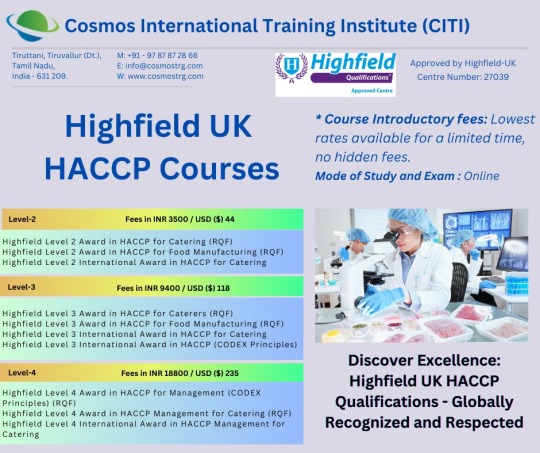
#𝗛𝗶𝗴𝗵𝗳𝗶𝗲𝗹𝗱 𝗨𝗞 𝗛𝗔𝗖𝗖𝗣 𝗧𝗿𝗮𝗶𝗻𝗶𝗻𝗴 𝐂𝐨𝐮𝐫𝐬𝐞𝐬#Level 2#• Highfield Level 2 Award in HACCP for Catering (RQF)#• Highfield Level 2 Award in HACCP for Food Manufacturing (RQF)#• Highfield Level 2 International Award in HACCP for Catering#Level 3:#• Highfield Level 3 Award in HACCP for Caterers (RQF)#• Highfield Level 3 Award in HACCP for Food Manufacturing (RQF)#• Highfield Level 3 International Award in HACCP (CODEX Principles)#• Highfield Level 3 International Award in HACCP for Catering#Level 4:#• Highfield Level 4 Award in HACCP for Management (CODEX Principles) (RQF) v2#• Highfield Level 4 Award in HACCP Management for Catering (RQF)#• Highfield Level 4 International Award in HACCP Management for Catering#Contact Us:#Mob:#+919787872866#Email:#[email protected]#Web:#www.cosmostrg.com#WhatsApp Channel :#https://whatsapp.com/channel/0029VaHMYayGufJ45OH4Xo1n#WhatsApp Group :#https://chat.whatsapp.com/IunhDueyuLsEPc9SkB7dlK#highfield#highfieldcourse#highfieldcourses#highfieldukcourses#HACCP
0 notes
Text

#𝐂𝐨𝐬𝐦𝐨𝐬 𝐈𝐧𝐭𝐞𝐫𝐧𝐚𝐭𝐢𝐨𝐧𝐚𝐥 𝐓𝐫𝐚𝐢𝐧𝐢𝐧𝐠 𝐈𝐧𝐬𝐭𝐢𝐭𝐮𝐭𝐞 (𝐂𝐈𝐓𝐈)#𝗛𝗶𝗴𝗵𝗳𝗶𝗲𝗹𝗱 - 𝗨𝗞#1. Food Safety (Level 1 to 4)#2. HACCP (Level 2 to 4)#3. Food Allergen (Level 2 to 3)#4. Nutrition & Health (Level 2 to 3)#Contact Us:#Mob:#+919787872866#+919787873866#Email:#[email protected]#Web:#www.cosmostrg.com#marrychristmas#Christmas#christmasshopping#christmas2023#foodsafety#HABC#highfieldcourses#highfield#food_safety_course#HACCP#haccpcourse#nutrition#NutritionCourse#foodallergies#foodsafetycourses#Foodcourses
0 notes
Text
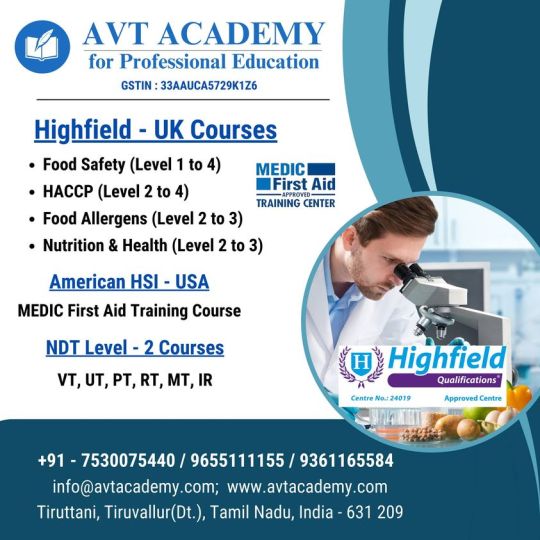
#𝗔𝗩𝗧 𝗔𝗰𝗮𝗱𝗲𝗺𝘆#𝗛𝗶𝗴𝗵𝗳𝗶𝗲𝗹𝗱 - 𝗨𝗞#1. Food Safety (Level 1 to 4)#2. HACCP (Level 2 to 4)#3. Food Allergen (Level 2 to 3)#4. Nutrition & Health (Level 2 to 3)#𝗔𝗺𝗲𝗿𝗶𝗰𝗮𝗻 𝗛𝗦𝗜 - 𝗨𝗦����#MEDIC First Aid Training#MEDIC First Aid Train the Trainer#𝗡𝗗𝗧 𝗟𝗲𝘃𝗲𝗹 𝟮 𝗖𝗼𝘂𝗿𝘀𝗲𝘀#1. Visual Testing#2. Liquid Penetrant Testing#3. Magnetic Particle Testing#4. Ultrasonic Testing#5. Radiographic Testing#6. Thermal/Infrared Testing#Contact Us:#Mob:#+919361165584#+917530075440#+919655111155#+919787637876#Email:#[email protected]#Web:#www.avtacademy.com#foodallergn#foodallergns#foodallergies#foodallergyawareness
1 note
·
View note
Text

Join CrescoSafe's HACCP Level 3 Training and become a certified expert in food hygiene. Limited seat availability, so register today to secure your spot. Visit our website or call us for more details.
#food hygiene training#HACCP Level 3 Certification#CrescoSafe Training Courses#Dubai HACCP Training#food safety and hygiene#best learning environment#HACCP certified courses#Dubai careers#certified professionals#Dubai jobs#HACCP training institute#CrescoSafe Dubai#food safety regulations#hygiene standards#professional development#quality assurance#safe food handling#career advancement
0 notes
Text

#𝗛𝗶𝗴𝗵𝗳𝗶𝗲𝗹𝗱 𝗨𝗞 𝗡𝘂𝘁𝗿𝗶𝘁𝗶𝗼𝗻 & 𝗛𝗲𝗮𝗹𝘁𝗵 𝐂𝐨𝐮𝐫𝐬𝐞𝐬#Level 2:#• Highfield Level 2 International Award in Nutrition and Health#Level 3:#• Highfield Level 3 International Award in Nutrition and Health#Contact Us:#Mob:#+919787872866#Email:#[email protected]#Web:#www.cosmostrg.com#WhatsApp Channel :#https://whatsapp.com/channel/0029VaHMYayGufJ45OH4Xo1n#WhatsApp Group :#https://chat.whatsapp.com/IunhDueyuLsEPc9SkB7dlK#highfieldcourses#highfield#food_safety_course#HACCP#haccpcourse#nutrition#NutritionCourse#foodsafetycourses#Foodcourses#FSSAI#foodsafetytraining#haccptraining#foodinspectiontraining#foodtrainingcourse
0 notes
Text

#𝗛𝗶𝗴𝗵𝗳𝗶𝗲𝗹𝗱 𝗨𝗞 𝗡𝘂𝘁𝗿𝗶𝘁𝗶𝗼𝗻 & 𝗛𝗲𝗮𝗹𝘁𝗵 𝐂𝐨𝐮𝐫𝐬𝐞𝐬#Level 2#• Highfield Level 2 International Award in Nutrition and Health#Level 3#• Highfield Level 3 International Award in Nutrition and Health#Contact Us:#Mob:#+919787872866#Email:#[email protected]#Web:#www.cosmostrg.com#WhatsApp Channel :#https://whatsapp.com/channel/0029VaHMYayGufJ45OH4Xo1n#WhatsApp Group :#https://chat.whatsapp.com/IunhDueyuLsEPc9SkB7dlK#highfieldcourses#highfield#habc#nutritioncourse#nutritiontrainingcourse#nurtrition#nutritiontraining#nutrition_and_health#healthcourses#nutritionhealth#FoodSafetyTraining#foodsafety#foodtrainingcourse#haccp
0 notes
Text
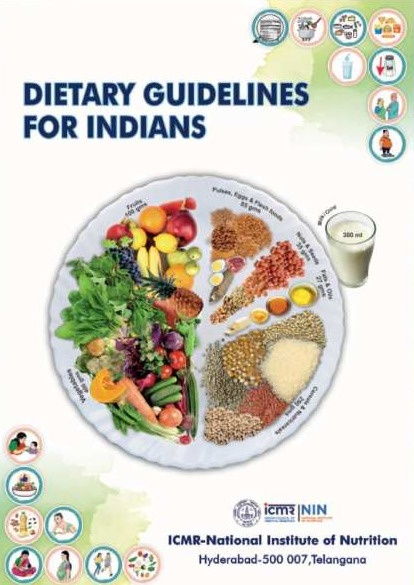
ICMR NUTRITION GUIDELINES 2024 BREAKDOWN : LSFITNESS
Statement 1 : Some protein powders, marketed in packages as protein supplements, contain protein from multiple sources. Protein powders may also contain added sugars, non-caloric sweeteners and additives such as artificial flavoring, hence, are not advisable to be consumed on a regular basis.
My Take: Protein powders that contain proteins from multiple sources are known as protein blends. These blends often include whey protein, casein protein, albumin, and others. Protein blends are completely safe for use if they are manufactured and processed in facilities that adhere to strict safety standards, such as those following HACCP (Hazard Analysis and Critical Control Points) guidelines.
Statement 2 : Protein powders may also contain added sugars, non-caloric sweeteners and additives such as artificial flavoring, hence, are not advisable to be consumed on a regular basis.
My Take: Protein powders may contain added sugars, non-caloric sweeteners, and artificial flavorings. However, these additives are commonplace in many foods we consume today. Rather than casting a negative light on whey protein supplements, it would be more beneficial to implement strict regulations that limit the use of added sugars. Additionally, encouraging the use of healthier non-caloric sweeteners, such as Fructo-oligosaccharides (FOS), and replacing artificial flavorings with natural ones could improve the nutritional quality of these supplements.
Statement 3 : Whey protein is rich in branched chain amino acids (BCAAs). Recent evidence suggests that BCAAs may increase the risk of certain non-communicable diseases (NCDs). As mentioned above, adequate non-protein energy from carbohydrate and fat is essential for dietary proteins/AA to be utilized for protein synthesis and for related functions in the body. Consuming high level of protein, especially in the form of protein supplement powders, is therefore not advisable.
My Take: Whey protein is indeed rich in branched-chain amino acids (BCAAs): leucine, isoleucine, and valine. Recent evidence has shown a direct correlation between elevated plasma levels of BCAAs and insulin resistance, but this does not necessarily mean it is caused solely by high consumption of BCAAs. The condition may also be due to dysfunctional BCAA catabolism, existing insulin resistance, or being overweight or obese.
Elevated plasma BCAA levels have been observed in individuals who are overweight or obese and exhibit insulin resistance, and these levels are higher compared to healthy individuals. Observational studies have found that plasma BCAA levels are also elevated in patients with Type 2 diabetes when compared to age and BMI-matched controls without diabetes.
Insulin plays a critical role in the metabolism of BCAAs. Results from Mendelian randomization studies indicate that insulin resistance drives higher plasma BCAA levels, and large-scale genetic studies suggest a causal role of diminished BCAA catabolism in underlying insulin resistance.
Dysfunctional BCAA catabolism may lead to the accumulation of a number of BCAA catabolic metabolites in the plasma of insulin-resistant individuals with obesity or Type 2 diabetes, including BCAA-derived acylcarnitines, 3-HIB, 2-HB, and 2-KB. These can have toxic effects on cellular functions. It has been shown that acylcarnitines can cause mitochondrial dysfunction in several tissues and anaplerotic stress, thus dysregulating glucose and fat oxidation.
While there is evidence that elevated BCAA levels can impair insulin signaling pathways, it remains unclear whether elevated BCAA levels are a cause or a consequence of insulin resistance. Most studies measure plasma BCAA levels rather than in peripheral tissues, so future research focusing on peripheral tissues could provide a better perspective on tissue-specific BCAA catabolism.
Statement 4 : Most athletes can get the recommended amount of protein through food alone, without the use of supplements. Protein powders are not required. Moreover, prolonged intake of a large amount of protein is associated with potential dangers, such as bone mineral loss and kidney damage.
My Take: Athletes can obtain the recommended amount of protein through their diet alone, depending on what they eat.
For example, a non-vegetarian athlete can easily meet protein needs from sources such as chicken breast, mutton, and whole eggs while maintaining overall caloric intake, as these sources contain fewer ancillary calories.
Conversely, let's consider an athlete who follows a vegan diet. Major vegan protein sources like tofu, cereals and millets, and pulses and legumes do provide some protein. However, if an athlete relies solely on these foods without supplements, the total calorie count may exceed caloric requirements due to the additional carbohydrates and fats in these protein sources.
Regarding the safety of protein consumption, prolonged intake of a significant amount of protein—ranging from 25-75 grams daily—has not been associated with potential dangers such as bone mineral loss and kidney damage. In fact, studies have shown a positive impact on bone mineral density.
The European Society on Parenteral and Enteral Nutrition (ESPEN) advocates for a higher protein intake of 1.0–1.5 g/kg/day to help slow age-related muscle loss.
There is no evidence to suggest that a high protein diet can cause kidney damage in individuals with healthy renal function. However, those with kidney disease, such as chronic kidney disease (CKD), should limit their protein intake.
3 notes
·
View notes
Text
Mastering Online Health Courses
Discover how to excel in online health courses and maximize your learning potential.
Benefits of Online Health Courses
Online health courses offer a range of benefits for learners. One of the main advantages is the flexibility they provide. With online courses, you can study at your own pace and fit your learning around your existing commitments. This flexibility is particularly beneficial for individuals who are working or have other responsibilities.
Another benefit of online health courses is the accessibility they offer. You can access course materials and resources from anywhere with an internet connection. This means you can study from the comfort of your own home or even while traveling. Online courses also often provide interactive learning materials, such as videos and quizzes, which can enhance your understanding and engagement.
Additionally, online health courses allow you to learn from experts in the field. Many online courses are developed and taught by experienced professionals, ensuring that you receive high-quality education. You can also connect with fellow learners from around the world, providing opportunities for collaboration and networking. Overall, online health courses provide convenience, accessibility, and expertise, making them an excellent choice for individuals looking to enhance their knowledge and skills in the field of health.
Tips for Success in Online Learning
To succeed in online health courses, it is important to establish a routine and set dedicated study times. Treat your online course like a regular class and allocate specific blocks of time for studying and completing assignments. Another tip for success is to actively participate in online discussions and forums. Engaging with your peers and instructors can enhance your learning experience and provide opportunities for asking questions and sharing insights.
Additionally, stay organized by keeping track of deadlines and creating a study schedule. Break down larger assignments into smaller tasks and set realistic goals for each study session. Finally, make use of available resources and support. Online health courses often provide access to additional materials, such as textbooks or supplementary readings. Take advantage of these resources to deepen your understanding of the subject matter.
Navigating Online Health Course Platforms
Online health course platforms can vary in their layout and features. To navigate these platforms effectively, familiarize yourself with the different sections and tools available. Start by exploring the course syllabus or outline to understand the structure and content of the course. This will help you plan your study schedule and prioritize your learning objectives. Next, take advantage of any orientation materials or tutorials provided. These resources can guide you through the platform's features, such as how to access course materials, submit assignments, and participate in discussions.
As you progress through the course, regularly check for announcements and updates from your instructor. These communications may contain important information or reminders about upcoming assignments or changes to the course schedule.
Finally, don't hesitate to reach out to your instructor or the platform's support team if you encounter any technical issues or have questions about navigating the platform. They are there to assist you and ensure a smooth learning experience.
Effective Study Strategies for Online Health Courses
Developing effective study strategies is crucial for success in online health courses. Consider implementing the following techniques to enhance your learning experience. First, create a dedicated study space that is free from distractions. This could be a quiet corner in your home or a local library. Make sure you have all the necessary materials, such as textbooks, notebooks, and a reliable internet connection.
Next, break down the course material into manageable chunks. Instead of trying to study everything at once, focus on specific topics or chapters. This will help you retain information more effectively and prevent overwhelm. Additionally, engage in active learning by taking notes, asking questions, and summarizing key concepts. Actively engaging with the material will reinforce your understanding and improve retention.
Furthermore, establish a study schedule and stick to it. Consistency is key in online learning. Set aside specific times each day or week for studying and make it a priority. Lastly, do not forget to take breaks and practice self-care. Online learning can be demanding, so make sure to give yourself time to rest and recharge.
Utilizing Resources for Online Health Courses
Online health courses often provide a wide range of resources to support your learning journey. Take advantage of these resources to enhance your understanding and maximize your learning potential. First, access the course materials provided. These can include lecture notes, slides, textbooks, and additional readings. Review these materials thoroughly to reinforce your understanding of the subject matter.
Additionally, explore any supplementary resources offered by the course, such as online libraries, research databases, or video lectures. These resources can provide additional perspectives and deepen your knowledge. Furthermore, engage with online forums and discussion boards. These platforms allow you to connect with fellow learners, ask questions, and share insights. Participating in discussions can enhance your understanding and provide different perspectives on the course material.
Lastly, seek support from your instructor or teaching assistants if you need clarification or additional guidance. They are there to help you succeed and can provide valuable insights and feedback.
Keywords Tag: Health and Safety Consultant, HACCP Training, Iosh Managing Safely, Level 3 Food Safety, Food Safety Training, health and safety courses, Health and Safety Training, Health and Safety Training Courses
URLs:
https://www.envesca.co.uk/
https://www.envesca.co.uk/courses/iosh-managing-safely-course/
https://www.envesca.co.uk/consultancy/health-safety-consultant/
https://www.envesca.co.uk/training-courses/food-safety-training/
https://www.envesca.co.uk/courses/highfield-level-2-haccp-training/
https://www.envesca.co.uk/training-courses/health-and-safety-training/
https://www.envesca.co.uk/courses/level-3-food-safety-in-catering-refresher/
Source: https://paricasino.info/mastering-online-health-and-safety-training-courses/
#Health and Safety Training#Health and Safety Consultant#HACCP Training#Iosh Managing Safely#Level 3 Food Safety#Food Safety Training#health and safety courses#Health and Safety Training Courses
0 notes
Text
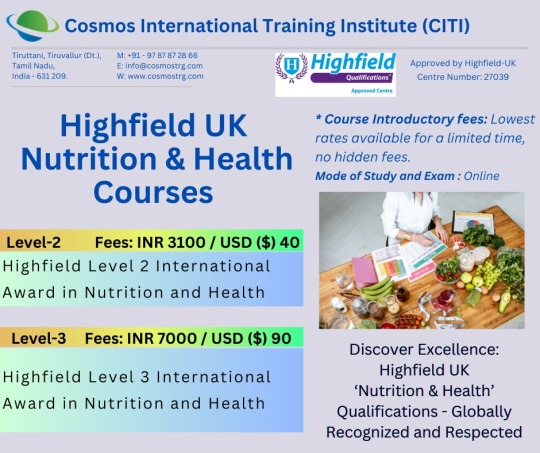
#𝗛𝗶𝗴𝗵𝗳𝗶𝗲𝗹𝗱 𝗨𝗞 𝗡𝘂𝘁𝗿𝗶𝘁𝗶𝗼𝗻 & 𝗛𝗲𝗮𝗹𝘁𝗵 𝐂𝐨𝐮𝐫𝐬𝐞𝐬#Level 2:#• Highfield Level 2 International Award in Nutrition and Health#Level 3:#• Highfield Level 3 International Award in Nutrition and Health#Contact Us:#Mob:#+919787872866#Email:#[email protected]#Web:#www.cosmostrg.com#WhatsApp Channel :#https://whatsapp.com/channel/0029VaHMYayGufJ45OH4Xo1n#WhatsApp Group :#https://chat.whatsapp.com/IunhDueyuLsEPc9SkB7dlK#highfieldcourses#highfield#food_safety_course#HACCP#haccpcourse#nutrition#NutritionCourse#foodsafetycourses#Foodcourses#FSSAI#foodsafetytraining#haccptraining#foodinspectiontraining#foodtrainingcourse
0 notes
Text
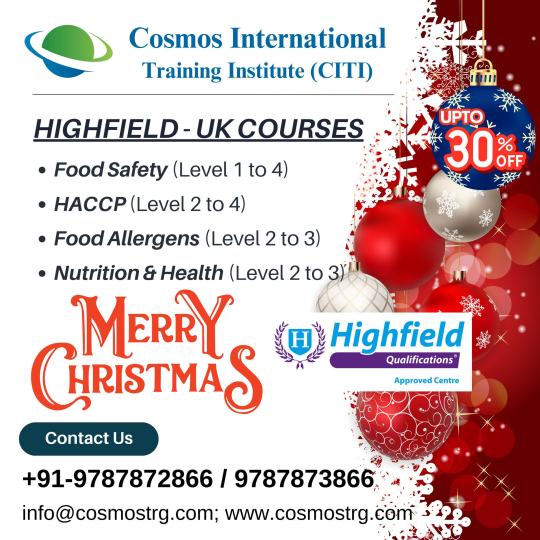
#𝐂𝐨𝐬𝐦𝐨𝐬 𝐈𝐧𝐭𝐞𝐫𝐧𝐚𝐭𝐢𝐨𝐧𝐚𝐥 𝐓𝐫𝐚𝐢𝐧𝐢𝐧𝐠 𝐈𝐧𝐬𝐭𝐢𝐭𝐮𝐭𝐞 (𝐂𝐈𝐓𝐈)#𝗛𝗶𝗴𝗵𝗳𝗶𝗲𝗹𝗱 - 𝗨𝗞#1. Food Safety (Level 1 to 4)#2. HACCP (Level 2 to 4)#3. Food Allergen (Level 2 to 3)#4. Nutrition & Health (Level 2 to 3)#Contact Us:#Mob:#+919787872866#+919787873866#Email:#[email protected]#Web:#www.cosmostrg.com#marrychristmas#Christmas#christmasshopping#christmas2023#foodsafety#HABC#highfieldcourses#highfield#food_safety_course#HACCP#haccpcourse#nutrition#NutritionCourse#foodallergies#foodsafetycourses#Foodcourses
0 notes
Text
i know this is wildly out of the bounds for anything anyone here cares about but. just seen a job for a food quality assurance manager that requires a level 2 haccp and a level 3 food safety cert. working panama nightshift. for less than £12 an hour. GIRL.
4 notes
·
View notes

